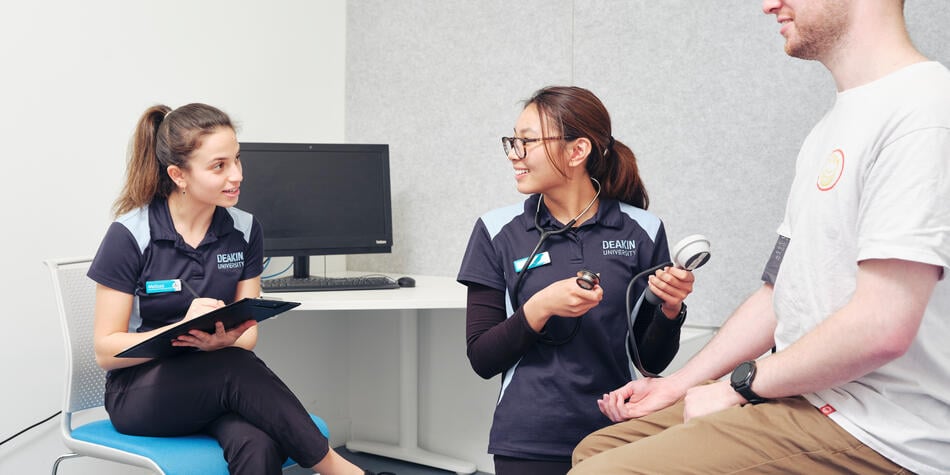If you love helping people, believe in the benefits of exercise and want to have a job that includes variety and a few challenges, then a career as a clinical exercise physiologist might be for you.
But let's be clear – an exercise physiologist is not a personal trainer or a physiotherapist. An accredited exercise physiologist (AEP) is an allied health professional who specialises in exercise and movement for the prevention and management of chronic diseases and injuries.
This is a difference Deakin has a wealth of experience in preparing its students for. Graduates of Deakin's Master of Clinical Exercise Physiology – the first accredited Exercise Physiologist course in Victoria – have received a number of awards from Exercise and Sports Science Australia (ESSA).
Senior Exercise Physiologist, Director at Pace Health Management and Deakin graduate, Ben Southam says being an exercise physiologist has given him so much satisfaction. 'Not only from a patient success point of view, but also due to the large variety of scope an exercise physiologist can work on each day.'
So what exactly does a career in clinical exercise physiology involve and what does it take to succeed? Ben gives us an inside look.
What does a typical day look like for an exercise physiologist?
'Being in the private sector, my patients can vary drastically from hour to hour which provides my workplace with a dynamic, exciting and ever-changing landscape,' Ben says.
'For example, one moment I can be seeing a 90-year-old osteoporotic lady, the next could be with a high-level triathlete managing his Achilles tendinopathy, while finishing off with a presentation to a local osteopathic clinic on the benefits of exercise physiology. For me, this variety is very important. As an added bonus working with people to help them become pain free, or achieve a specific goal is very rewarding,' he says.
What are the best parts and challenges?
Ben loves working with people each day to help them move better and feel better and it makes him feel especially good when people express their genuine appreciation for his work. 'It clearly can be life changing for many people,' he says. But with the good also comes a few challenges:
'Starting out in private practice is hard. You need to network well and educate GPs, other allied health professionals and the general public on the role an AEP plays. There are many long days and unpaid work initially during this stage which can be challenging, yet the outcomes and positives that come out of this are well worth it,' he says.
What's the difference between a physiotherapist and a clinical exercise physiologist?
Ben is often asked this question and has a well-versed 'elevator-pitch':
'Physiotherapists are specialists at diagnosis, treating and managing acute injuries or acute flare-ups using manual therapy along with acute exercise prescription. An accredited exercise physiologist specialises in chronic disease or injury management by prescribing exercise to assist/improve that patient’s management of their chronic disease. The more clearly we distinguish each other's role, the better the working relationship becomes.'
An accredited exercise physiologist specialises in chronic disease or injury management by prescribing exercise to assist/improve that patient’s management of their chronic disease.
Ben Southam
Senior Exercise Physiologist, Director at Pace Health Management and Deakin graduate
What skills do you need to succeed as an exercise physiologist?
Coming from a private practice view point, Ben says great people skills and the ability to network is important.
Technical knowledge of pathologies within an exercise physiology scope and exercise prescription guidelines is a given.
Good communication skills are also important as you will need to explain to the average person why they need to exercise more relating specifically to their condition, he says.
Organisational skills are key, as there is a lot of work in the programming and action planning for each client appropriately using an evidence-based approach. And it goes without saying that high motivation and eagerness to succeed will be beneficial.
What are the best school subjects and university qualifications?
Looking back, Ben suggests high school subjects that offer a good foundation for a career in exercise physiology include PE, biology and English (for report writing purposes).
Other than that, he recommends a keen interest in the way the body moves and helping people. In terms of university qualifications and industry experience – Ben completed a Bachelor of Exercise and Sport Science, followed by a Master of Clinical Exercise Physiology at Deakin University. He then completed 500 clinical placement hours. ‘The more experience you can get the better,’ he recommends.
Deakin's Bachelor of Exercise and Sport Science gives all students at least 220 hours of practical experience so graduates are job-ready, and in the Master of Clinical Exercise Physiology, students get to develop their practice skills in the award-winning Deakin Clinical Exercise Centre at Burwood (Melbourne).
Is there much scope and diversity in the industry?
There is huge scope as an accredited exercise physiologist, Ben says. Industries or organisations that include exercise physiologist roles:
- public and private hospitals settings
- primary, secondary and tertiary health care
- within private and multidisciplinary clinics
- population health
- workplace health and rehabilitation
- ageing and aged care
- fitness centres, gymnasiums, business
- sporting clubs.
Interested in pursuing a career in clinical exercise physiology? Check out how Deakin can take you there with a Bachelor of Exercise and Sport Science and Master of Clinical Exercise Physiology.

